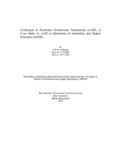Challenges in Electronic Government Procurement (e-GP): a case study on e-GP in Directorate of Secondary and Higher Education (DSHE)
Abstract
Electronic government procurement (e-GP) facilitates higher quality outcomes for public procurement of Bangladesh through improved accessibility of different stakeholders, create competitive environment for government expenditure, automation improving efficiency and reducing processing costs, ensure greater transparency and accountability. e-GP system is introduced in Directorate of Secondary and Higher Education (DSHE) in 2017. e-GP is an effective tool for reforming public procurement system by implementing appropriate policy and legal framework, effective procurer and supplier activation. For an effective implementation of e-GP system, strong awareness building among stakeholders, capacity building programs, technological frame development are required. To ensure sustainability in e-GP a change management and leadership are also required. Multidimensional changes are required for implementing e-GP in DSHE. Only purchasing new hardware, software or developing infrastructure is not enough to bring changes in DSHE procurement system. Beside this, bring change in the areas of government official and bidder behavior, skills, regulations and legislation, operational policies are also highly required for ensuring e-GP’s changes sustainability. Absence of proper change management in government procurement, expected result from e-GP like transparency, efficiency, effectiveness will not reflect in government procurement. This study searches current challenges of implementing e-GP from both hard and soft aspects in DSHE. Finally, some recommendations are put forward based on primary and secondary data of this research. The result shows that lack of transparency, lack of clear understanding about e-GP system among stakeholders; insufficient internet speed, user unfriendly e-GP websites and its operating procedure, complexity in error correction are the challenges in implementing e-GP in DSHE. This study also shows that e-payment complications, shortage of practical &refreshing training, conflicting procurement rules between donor agencies and government, lack of central database of verified suppliers, lack of IT knowledge of top management and supplier, centralized of authorities by Central Procurement Technical Unit (CPTU), coercion among bidders and lengthy procurement cycle are creating major barriers of successful implementation of e-GP in DSHE. It is very difficult to ensure good governance, performance, and quality without overcoming these challenges. Finally, some recommendations are put forward based on the findings of the study which includes revise training procedure and arrange refreshment training of e-GP, One stop service Centre need to establish for solving any e-GP portal related problem. Moreover, Ensure high internet speed and its continuity, central verified vendor database for smooth evaluation, bring transparency in e-GP by ensuring accountability among stakeholders and create online payment facility for all types of e-GP payment.

